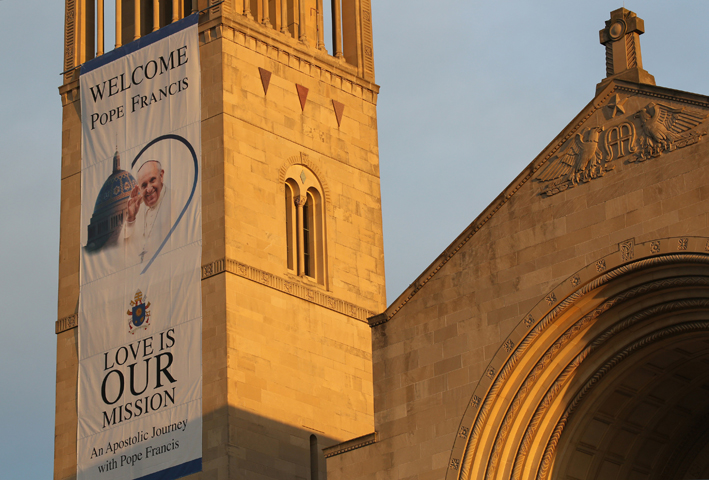
An image of Pope Francis hangs from the bell tower of the Basilica of the National Shrine of the Immaculate Conception in Washington Sept. 20. Pope Francis will celebrate Mass outside the basilica Sept. 23. (CNS/Bob Roller)
When Pope John Paul II visited the U.S. in 1999, I was in college in St. Louis. Now that I'm enrolled in graduate school in New Jersey and living in Philadelphia, Pope Francis is paying a visit to my city.
It's interesting to witness two papal visits at two different times in my life and in the world. In 1999, I had just entered the world of adulthood, and I considered myself a deeply religious young woman, strict in my interpretation of scripture, and not open to much that strayed from it. The atmosphere of the papal visit was a reflection of the world's state of mind. It was carnival-like and free from worry. I remember walking with a few classmates about a mile or so from campus to Forest Park where crowds were gathered, waiting for the pontiff to pass by in his popemobile. We strolled over with our backpacks strapped on, not passing through a single metal detector, not eyed by anyone with suspicion.
Today I'm a spiritual, somewhat anti-church woman who lives in a post-9/11 world. Philadelphia officials have been unveiling the security plan for the papal visit little by little for several weeks, presumably so as not to tip off terrorists. Backpacks are among the long list of forbidden items.
One thing has remained the same between the two visits: a sense of expectation and hope. Philadelphia folks might be more excited about the economic impact the World Meeting of Families will have on the city than the spiritual impact, but I get the feeling that the papal visit still inspires hope.
I've been thinking about what -- in the midst of declining church attendance, decreasing numbers of believers, and increasing awareness about and discontentment with past and present racism, sexism and homophobia in Christianity -- makes believers continue to believe. I and many other many other feminists have asked and answered why we stay in patriarchal traditions. At the Women's Ordination Worldwide 2015 conference last week, people asked Dr. Shannen Dee Williams similar questions after her presentation about the history of black sisters in the U.S. Intense racism forced many out of their orders, but the vast majority of them remained Catholic. Why?
I've come to believe there is a sense of stubbornness, perhaps inherent, in God-fearing people, whatever their religious tradition may be. This is different from optimism, which makes people believe that things will get better. Stubbornness tells you that your cause will succeed -- even if circumstances surrounding it don't get better -- and there is no greater cause than God's calling.
Williams reminded me of this in her answer to why they stayed. Many sisters and former sisters told her some variation of, "Because I was called by God, no human authority was going to interfere with that, and anything that attempted to was not real, was not true, was not Catholicism."
When God tells believers, "The injustice that you're seeing isn't me," they become stubborn. They fight to change institutions so that the institutions reflect who they know God is.
I'm beginning to understand that this is why feminists stay in patriarchal religious traditions and African American sisters formed the National Black Sisters Conference in 1968 but didn't leave the Catholic church. This is why people who identify as gay, lesbian or transgender still seek out and manage to find houses of worship they can call home and feel welcome in, and why, much to the dismay of a good friend who doesn't understand why religion exists at all these days, Christianity hasn't died out. The people know the truth, and they're hanging around to help set everyone else free.
[Mariam Williams is a Kentucky writer living in Philadelphia and pursuing MFA in creative writing at Rutgers University-Camden. She is a contributor to the anthology Faithfully Feminist and blogs at RedboneAfropuff.com. Follow her on Twitter: @missmariamw.]
Editor's note: We can send you an email alert every time Mariam Williams' column, At the Intersection, is posted to NCRonline.org. Go to this page and follow directions: Email alert sign-up.


